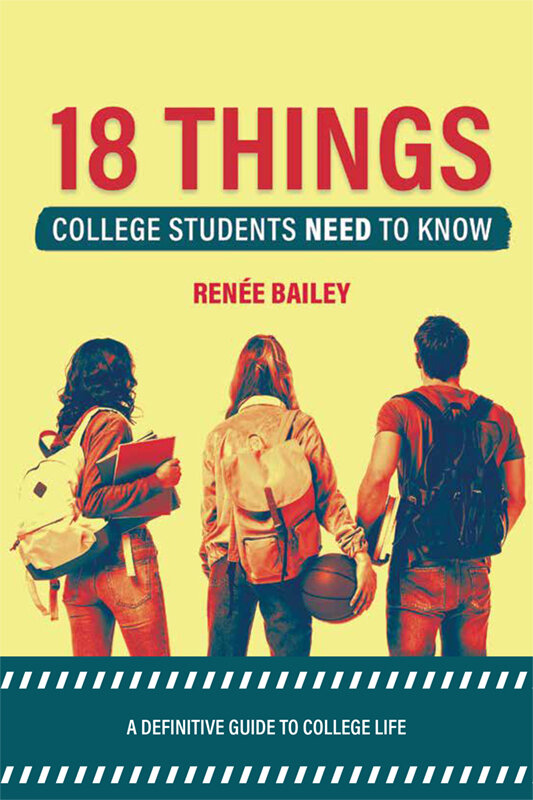Photo by Alexis Brown on Unsplash.
According to multiple studies, US college students demonstrate a high rate of anxiety - roughly 38% of female-identifying college students and 27% of male-identifying college students report that their stress level is so high it negatively affects their academic performance. Higher education is no joke - the academics, the social burdens, financial stress, and the pressure to cram a lot into a short amount of time can take its toll on students just transitioning to adulthood.
The goal of Renee Bailey’s book 18 Things College Students Need to Know is “to give you the tricks, hacks, and tools to handle your college stresses in a proactive way and make the best of the educational opportunity that college is.” The teachers and staff at PCH Tutors have curated our 10 favorite tips for college-bound students and takeaways from Bailey’s book in the hopes they’ll convince you to put some extra thought into your college-bound life and make the best decisions for a successful life and career.
1. Don’t overload yourself.
“Twelve units of classes per semester is considered a full-time student and that’s about four classes if each course is three credit hours. A course at three credit hours means that you’ll spend at least three hours in class each week. It doesn’t stop there. For every credit hour you’ll also be expected to do three hours of work a week on reading and other assignments. So, you’re spending twelve hours a week on just that one class. Four classes equals forty-eight hours a week, which is more hours than working a full-time job.”
Bailey does the math for us here and it’s easy to see how the amount of time required to do well in college classes goes well beyond what students would think simply looking at their class schedules. For college freshmen there is a significant learning curve in developing the time management and study skills necessary for success. Which is why anyone savvy to the idea that college is a time for purposeful exploration of your academic and career interests will tell you that it’s important to ease into the rigors of college and give yourself the space to think about what you want out of the experience. You don’t get that opportunity when you rush headlong into an 18-unit course load your first semester of college.
“Let go of any guilt or concern you have about meeting the expectations of those around you. They have no say in the matter because they won’t be doing the work for you. If you’re uncomfortable taking more than twelve units per semester, then don’t do it. If you want to do twenty units in a semester to finish up earlier, then do it! There’s a saying amongst runners: ‘You’ve got to run your own race.’ Running your own race means going at your own pace and not worrying about those around you.”
2. Make an effort to stay physically fit.
“If you either weren’t asked to participate or chose not to participate in college athletics, you could find yourself being a bit of a couch potato.”
When playing a sport and pursuing your academic goals simultaneously is no longer a self-imposed requirement for improving your chances of admission at your “dream college,” the reality is most students fall off the fitness wagon at some point or another. As Bailey notes, there are also a multitude of new demands on students’ time (making new friends, studying, and participating in on campus activities), which tend to edge out self-care activities like maintaining a daily exercise routine. To combat the tendency to neglect this aspect of our lives Bailey recommends building time into your schedule to participate in some movement or physical activity on a regular basis.
“There’s always an hour here or there that can be used to run, play a quick soccer game, or go to the gym. It’s as simple as making your fitness as much a priority as anything else and scheduling it. Whether it’s before work, between classes, or after classes, figure out a time and stick to it. If it’s on your schedule, you’re much less likely to blow it off.”
Though it might not seem like it in the moment, you’ll do yourself a huge favor by making the time stay physically fit.
“Take care of your body. It’s the only place you have to live.” - Jim Rohn.
3. Study with other people.
“There is no substitute for collaboration when it comes to academics. It is my personal feeling that it is unreasonable for you to expect yourself to completely understand every aspect of every topic in every class”
Studying with friends or joining a study group to better understand a topic is a quintessential part of college. You can’t do it all on your own. Ok well you can, but it will probably be boring and not nearly as fun as working with your friends and classmates. Honestly, there’s a very good chance that you’ll make some of your closest friends in one way or another through the social connections you develop studying with other students.
Bailey has some great ideas about the ideal mix of students you’ll want as a part of your study group.
“If I were going to generalize... I would say there’s probably three main types to look for [in forming a study group]...people who are incredibly smart and know the bulk of the material so well they could almost teach it...people who are doing well but need a little more time with the material to understand it fully…and...last, but not least, you need the person who is really struggling and really needs the group’s help.”
Tim Gouw for Unsplash.
4. Learn to become your own person.
“Your parents are some of the most important people in your life. “Important” doesn’t have to be “good.” Important simply means that what your parents do has a large impact on your life”
Bailey acknowledges that for students beginning their first year of college one of the impactful relationships in their life thus far has been the relationship they have with their parents and the experiences their parents have or have not provided for them. Yet, for students college represents an open avenue for them to take on greater agency in their own lives and decide on the life they want to build for themselves.
“It’s your time to discover that which makes you unique, cement your own personality, and find your own path in life...whether you’re ready or not, the adulthood switch has flipped, and you are expected to “adult.”
She notes that the freedom to “adult” in college is both exhilarating and daunting. However, it's a privilege for students to be allowed to take the time and space to figure out for themselves who they want to become and define the future roles they will play as contributing members of society.
5. Explore interesting classes.
“The first few years of college are your chance to explore and see where your interests truly lie, even if you think you already know...When you enter college, you’re young and probably the most open to new ideas that you’re going to be for the rest of your life.”
Bailey hits the nail on the head when she acknowledges that for every student one of the most valuable aspects of college lies in the opportunity it provides for students to learn about new and interesting topics as well as discover whether or not they want to pursue a career in a particular field. So take heed of her advice and take advantage of the interesting educational opportunities that present themselves. She also recommends that students avoid chafing against the general education requirements that colleges have put in place.
“General education requirements and prerequisites provide you the opportunity to learn about a subject that you might not have thought to study. You might even find you like it! The miracle of this is that you might find an interest you never would have known about had you not been “forced” to take a course.”
6. Make yourself part of the community.
“If you’re going to be in a place for an extended period of time, why not leave that place in better shape than when you entered it?”
Bailey highly recommends making the most of the physical location of your chosen educational institute. Whether you’re a city-born kid studying in a rural area or a community college student discovering overlooked gems in their home hometown, there are a number of ways you can use your college experience to explore the area outside of your classroom.
Additionally, Bailey suggests a number of organizations and groups you can join that will help ground you and give you opportunities to give back to the community that is housing and educating you, or to just connect with an awesome network.
“There are community services you will be helped by and people that you are going to benefit from over the course of your time in the community…. Wouldn’t it make sense to show your appreciation for that support by giving back to those who have provided it? Huge opportunities exist for you to do just that.”
And don’t forget to “find your weird.” Got a random hobby or interest? A group probably exists with other like-minded weirdos. Google is your friend!
“Where are my fellow Harry Potter fans?! You can nerd out at the University of Arizona and play quidditch on a mini football field.”
7. Watch your finances.
“We weren’t all born with a silver spoon in our mouths, so to speak, but we can all be fed by one at the end of our lives if we’re careful and make financially sound decisions over the course of time. Financially sound decisions start when you are young. That includes how you’re going to pay to further your education after high school.”
Money can be stressful, and even once you’re making money, it’s hard to manage it wisely if you don’t start adopting healthy financial habits. Ask any adult, and most will tell you we wish we’d spent more time learning how to save wisely, pay taxes, or juggle credit cards and school loans before we went to college. Higher education can be expensive, and even if you’re not footing the bill, making smart decisions about money while you’re still a student absolutely pays off further down the road.
“Some people question whether getting a college education is even worth the cost involved, especially given the rapid rise of college tuition and the cutbacks that have occurred to federal funding for student financial aid (grants and loans).”
If you’re not sure college is for you, Bailey walks you through how to weigh the pros and cons and financial cost-benefit analysis before you make a firm decision.
“Hopefully, with the few facts that I have given you already regarding the increase in lifetime earnings and such, you understand that there can be a rather large advantage to becoming a college graduate.”
Bailey offers a number of tangible and helpful tips for getting and staying on financial track when you’re in high school and at college. Applying for financial aid, budgeting, and protecting yourself from identity theft are just a few of the areas you can monitor that will save you money - and potential stress - long-term.
8. Go to office hours.
Bailey considers one of the most valuable learning tools in your higher education arsenal to be the access to your teachers and professors. “Office hours or tutoring hours are the times during which your professors make themselves available to you, the student, in order to answer questions, clarify topics, review assignments or exams, and just generally help.”
Large class sizes - especially general education classes or freshmen requirements - can be overwhelming for students and demanding of professors. You may not be able to get all your questions answered during class.
“Professors and TAs… provide you the extra time and privacy to ask those questions on a one-to-one basis or, at least, a small group basis.”
As a former TA herself, Bailey has experienced an overwhelming neglect of students attending office hours, but offers insight on how richly beneficial taking advantage of these office hours can be.
“Discussions sometimes review material that you won’t have other opportunities to get. Going to office hours will help you clarify concepts and get helpful and individualized answers to your questions. You may even get hints as to those ideas that will be the focus of the exams that they will be giving. After all, who knows better than the professor or TA?”
Mimi Thian for Unsplash.
9. Use your critical thinking skills and study “outside the box.”
“To be able to understand the difference and adjust your method of studying based on that knowledge can mean the difference between success and failure. ”
Don’t just memorize facts and information! While in some classes, and for some topics, this may be a necessity (international language vocabulary lists come to mind) but being able to truly comprehend and analyze the information you’re learning is really where it sticks and you set yourself apart (and up for success).
Bailey dives into different learning styles and how identifying yours can help you make the most of your studying and find study techniques that work for you. Being able to dig deeper into your research and class material will help you not only retain facts, but to see them in the context of a much bigger picture.
“...Real learning—the kind of learning that we’re meant to do at the college level—goes beyond that most fundamental part of the learning process. It moves learning into the space where you’re not just retelling the story the professor has told you, but you’re telling the story and also expanding upon it. ”
10. Map a path to graduation.
“Doesn’t it just make sense that if you want to get from point A to point B, you need to know where point B is? If you don’t know where you’re going, all you’re going to do is walk in circles without accomplishing anything. Don’t allow yourself to fall into that trap.”
It may sound simple, but having an end goal is a primary key to college success. While it may take some time to hone in on a major, having a general idea of where you want to go and smartly strategizing in the beginning can help you in the long run, no matter what area you end up in. For example, Bailey writes:
“If you’re scientifically minded, make sure you’re on course to obtain a degree in a scientific discipline. Find out what the core curriculum of scientific majors (for example, engineering, chemistry, biology, or psychology) is. Pick the courses that apply to the widest array of majors and start taking those. That way, if you decide to change majors, you’ll likely have fewer extra classes to take later on.”
Bailey highly recommends utilizing tools like your course catalog and your academic advisor to carefully plot out a schedule, and offers tips and guidelines for how to make the most of what your school offers.
“‘Success is not obtained overnight. It comes in installments; you get a little bit today, a little bit tomorrow until the whole package is given out. The day you procrastinate, you lose that day’s success.’ -Israelmore Ayivor”
For more strategies, tips, and other advice, order a copy of Renée Bailey’s book 18 Things College Students Need to Know, available through her publisher or directly on her website.
For help with your college-bound prep and college-aged mentors for your younger minds, contact us!
Renée Bailey
has two undergrad degrees and a master’s degree in performance psychology. She has taught at the college level and now writes and speaks to high school and college students.






